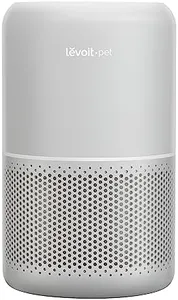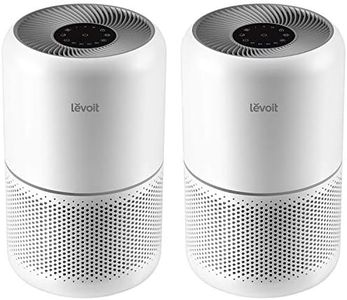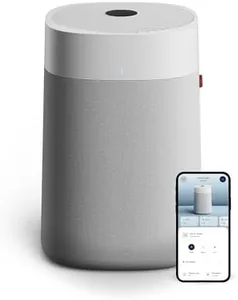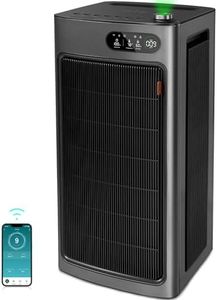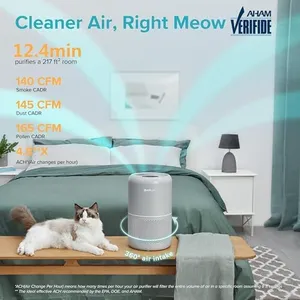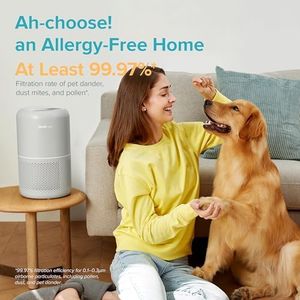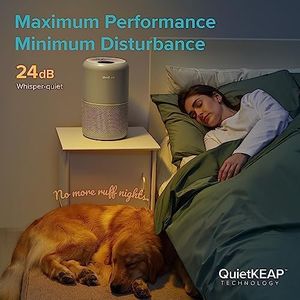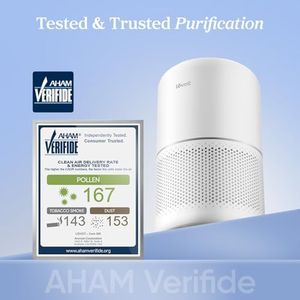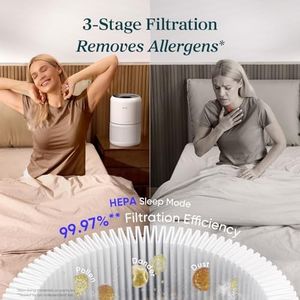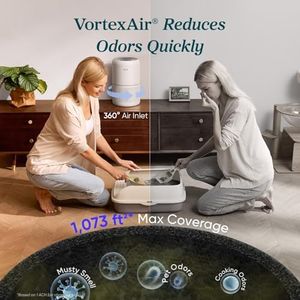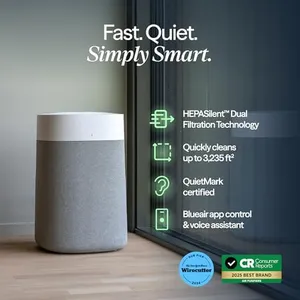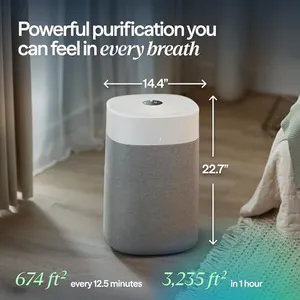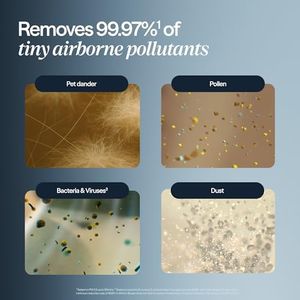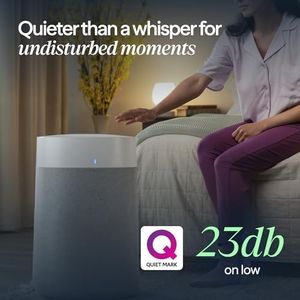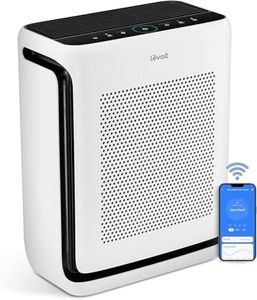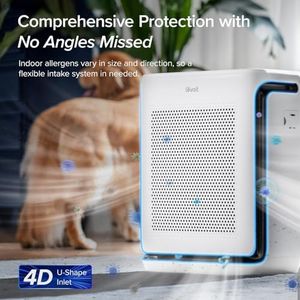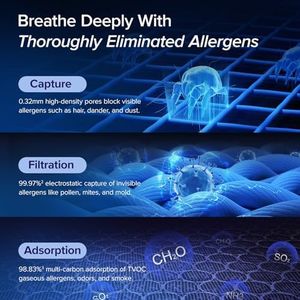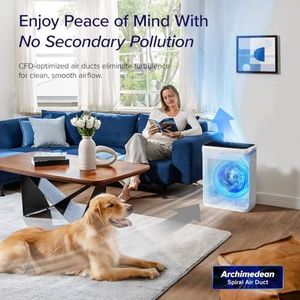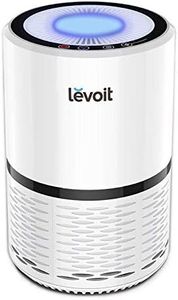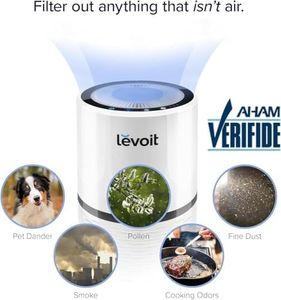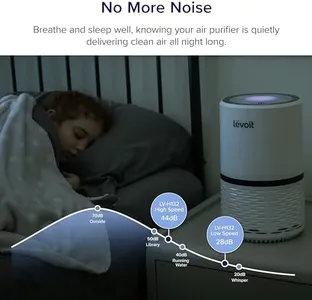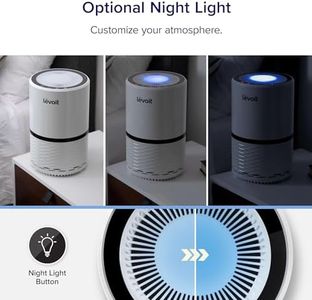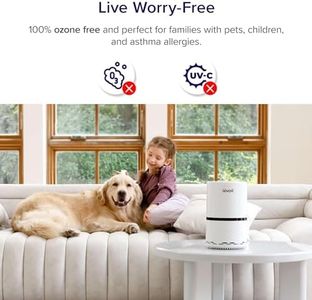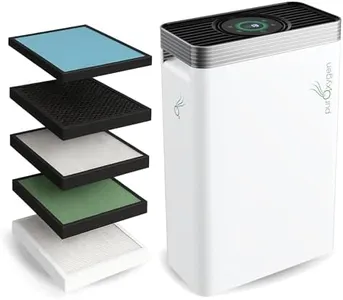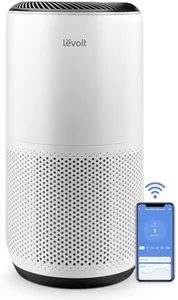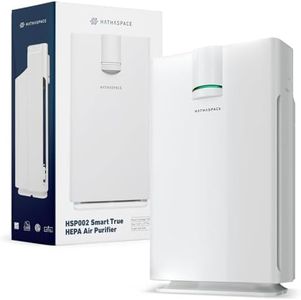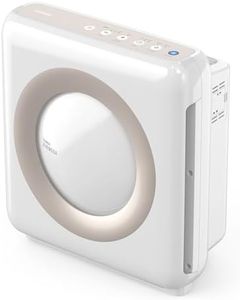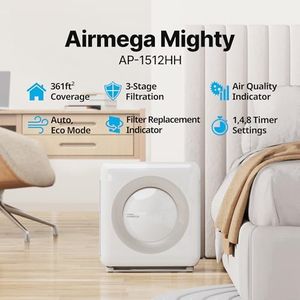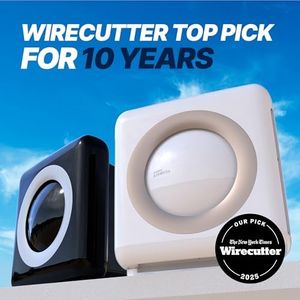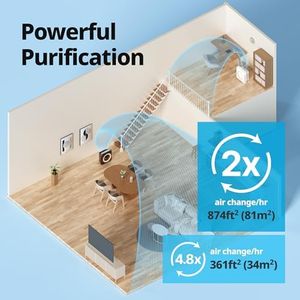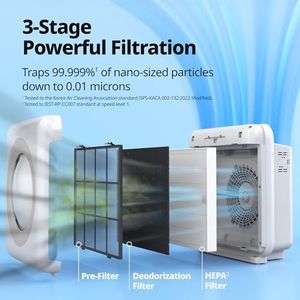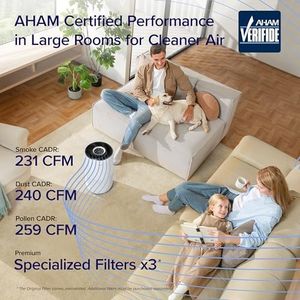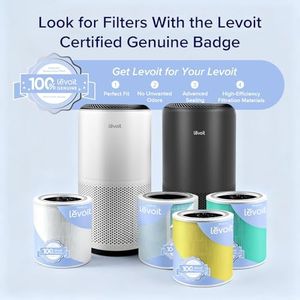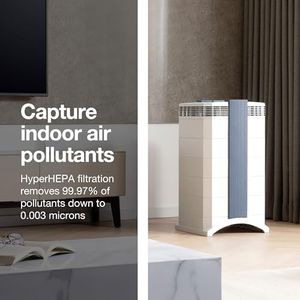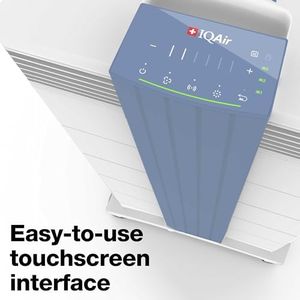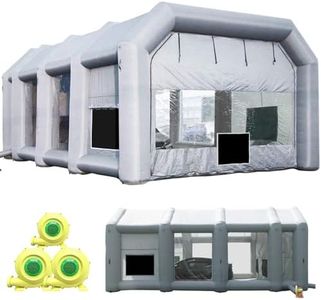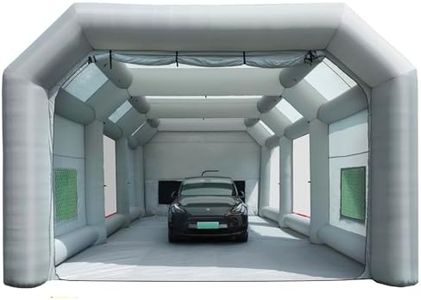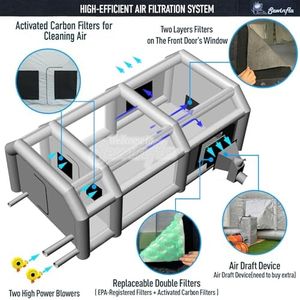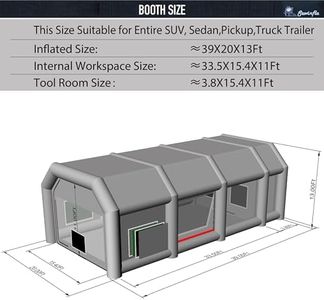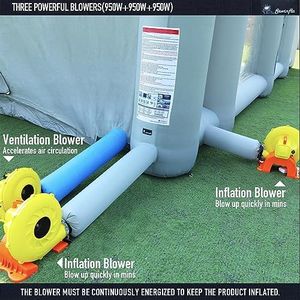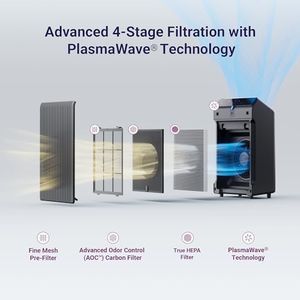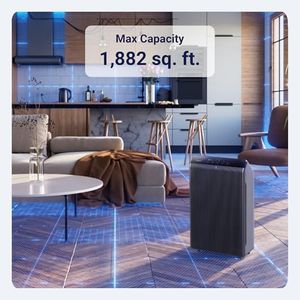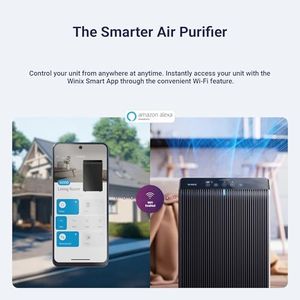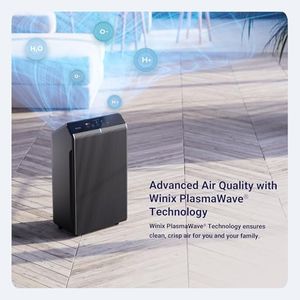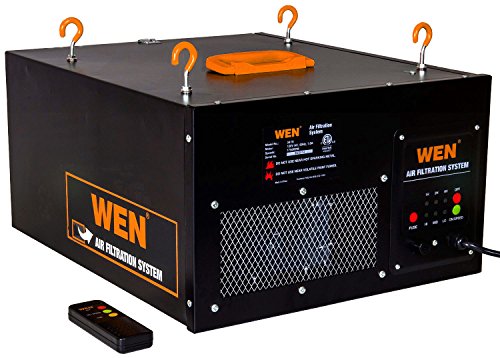10 Best Air Filtration For Garage 2026 in the United States
Winner
LEVOIT Air Purifier for Pets, Home, Large Rooms, and Bedrooms, HEPA Sleep Mode, AHAM VERIFIDE, Efficient Filter for Pet Dander, Odors, Captures Smoke, Dust, Mold, Pollen, Pet Lock, Core P350-P, Grey
The LEVOIT Air Purifier Core P350-P is designed with pet owners in mind, using an efficient activated carbon filter to neutralize odors, pet dander, smoke, and other pollutants. Its 3-in-1 filtration system, including a HEPA filter, is effective for providing cleaner air, which could be beneficial in a garage setting where dust and odors are prevalent.
Most important from
119691 reviews
LEVOIT Air Purifier for Home Allergies Pets in Bedroom, Covers Up to 1073 ft² by 56W High Torque Motor, AHAM VERIFIDE, 3-in-1 Filter, HEPA Sleep Mode, Remove Dust Smoke Odor, Core300-P, White, 2 Pack
The LEVOIT Air Purifier, Core 300-P, is a versatile air purifier that is well-suited for garages due to its strong purifying capabilities and coverage area of up to 1095 ft². With a high Clean Air Delivery Rate (CADR) of 141 CFM, it efficiently filters out dust, smoke, and other pollutants, making it ideal for spaces where such contaminants are common. The HEPA-grade filter ensures 99.97% filtration efficiency for particles as small as 0.1 to 0.3 microns, which is excellent for capturing pollen, dust, and pet dander. The option to choose specialized filters, like the Smoke Remover or Pet Allergy Filter, adds to its versatility. This is particularly handy for garages that double as workshops or have high levels of smoke and odors.
Most important from
119691 reviews
BLUEAIR Air Purifiers for Large Rooms, Cleans 3,048 Sqft In One Hour, HEPASilent Smart Air Cleaner For Home, Pets, Allergies, Virus, Dust, Mold, Smoke - Blue Pure 211i Max
The BLUEAIR Air Purifier for Large Rooms is a solid option for air filtration in a garage, especially if you have a larger space to cover. It impressively cleans up to 3,048 square feet in an hour, which is beneficial for garages that might accumulate a lot of dust and pollutants. The HEPASilent technology combines HEPA filtration with electrostatic filtration, providing efficient removal of 99.97% of airborne particles, including viruses, smoke, and allergens down to 0.1 microns. This makes it suitable for environments with heavy dust and potential pollutants like a garage.
Most important from
3129 reviews
Top 10 Best Air Filtration For Garage 2026 in the United States
Winner
LEVOIT Air Purifier for Pets, Home, Large Rooms, and Bedrooms, HEPA Sleep Mode, AHAM VERIFIDE, Efficient Filter for Pet Dander, Odors, Captures Smoke, Dust, Mold, Pollen, Pet Lock, Core P350-P, Grey
LEVOIT Air Purifier for Pets, Home, Large Rooms, and Bedrooms, HEPA Sleep Mode, AHAM VERIFIDE, Efficient Filter for Pet Dander, Odors, Captures Smoke, Dust, Mold, Pollen, Pet Lock, Core P350-P, Grey
Chosen by 1194 this week
LEVOIT Air Purifier for Home Allergies Pets in Bedroom, Covers Up to 1073 ft² by 56W High Torque Motor, AHAM VERIFIDE, 3-in-1 Filter, HEPA Sleep Mode, Remove Dust Smoke Odor, Core300-P, White, 2 Pack
LEVOIT Air Purifier for Home Allergies Pets in Bedroom, Covers Up to 1073 ft² by 56W High Torque Motor, AHAM VERIFIDE, 3-in-1 Filter, HEPA Sleep Mode, Remove Dust Smoke Odor, Core300-P, White, 2 Pack
BLUEAIR Air Purifiers for Large Rooms, Cleans 3,048 Sqft In One Hour, HEPASilent Smart Air Cleaner For Home, Pets, Allergies, Virus, Dust, Mold, Smoke - Blue Pure 211i Max
BLUEAIR Air Purifiers for Large Rooms, Cleans 3,048 Sqft In One Hour, HEPASilent Smart Air Cleaner For Home, Pets, Allergies, Virus, Dust, Mold, Smoke - Blue Pure 211i Max
LEVOIT Air Purifiers for Home Large Room Up to 1875 Ft² with Washable Pre-Filter, AHAM VERIFIDE, Air Quality Monitor, HEPA Sleep Mode for Allergies, Pet Hair in Bedroom, Vital 200S-P, White
LEVOIT Air Purifiers for Home Large Room Up to 1875 Ft² with Washable Pre-Filter, AHAM VERIFIDE, Air Quality Monitor, HEPA Sleep Mode for Allergies, Pet Hair in Bedroom, Vital 200S-P, White
LEVOIT Air Purifier for Home, AHAM Verifide, High-Efficiency Filter for Smoke, Dust, Pollen, and Odors in Bedroom, Office, or Nursery, Optional Night Light, Quiet Operation, LV-H132, White
LEVOIT Air Purifier for Home, AHAM Verifide, High-Efficiency Filter for Smoke, Dust, Pollen, and Odors in Bedroom, Office, or Nursery, Optional Night Light, Quiet Operation, LV-H132, White
Coway Airmega AP-1512HH(W) True HEPA Purifier with Air Quality Monitoring, Auto, Timer, Filter Indicator, and Eco Mode, 16.8 x 18.3 x 9.7, White
Coway Airmega AP-1512HH(W) True HEPA Purifier with Air Quality Monitoring, Auto, Timer, Filter Indicator, and Eco Mode, 16.8 x 18.3 x 9.7, White
LEVOIT Air Purifiers for Home Large Room Up to 1733 Ft² With HEPA Sleep Mode, AHAM VERIFIDE, Auto Mode, Air Quality Monitor, Smart WiFi, 3-in-1 Filter For Pet Allergy, Smoke, Dust, Core 400S-P, White
LEVOIT Air Purifiers for Home Large Room Up to 1733 Ft² With HEPA Sleep Mode, AHAM VERIFIDE, Auto Mode, Air Quality Monitor, Smart WiFi, 3-in-1 Filter For Pet Allergy, Smoke, Dust, Core 400S-P, White
IQAir GC MultiGas XE Air Purifier – Smart MultiGas Filtration for Rooms up to 1125 sq ft - Chemicals, Odors, VOCs, and Particles, Swiss Made, WiFi Enabled
IQAir GC MultiGas XE Air Purifier – Smart MultiGas Filtration for Rooms up to 1125 sq ft - Chemicals, Odors, VOCs, and Particles, Swiss Made, WiFi Enabled
Sewinfla Professional Inflatable Paint Booth 39x20x13Ft with 3 Blowers (1100W+1100W+950W) & Air Filter System Portable Paint Booth Tent Garage Inflatable Spray Booth Painting for Cars
Sewinfla Professional Inflatable Paint Booth 39x20x13Ft with 3 Blowers (1100W+1100W+950W) & Air Filter System Portable Paint Booth Tent Garage Inflatable Spray Booth Painting for Cars
WINIX 5510 Air Purifier (New Generation of 5500-2 with App Support) for Home Large Room Up to 1881 Ft² in 1 Hr, True HEPA, High Deodorization Carbon Filter and Auto Mode, Captures Pet Allergies, Smoke
WINIX 5510 Air Purifier (New Generation of 5500-2 with App Support) for Home Large Room Up to 1881 Ft² in 1 Hr, True HEPA, High Deodorization Carbon Filter and Auto Mode, Captures Pet Allergies, Smoke
Our technology thoroughly searches through the online shopping world, reviewing hundreds of sites. We then process and analyze this information, updating in real-time to bring you the latest top-rated products. This way, you always get the best and most current options available.

